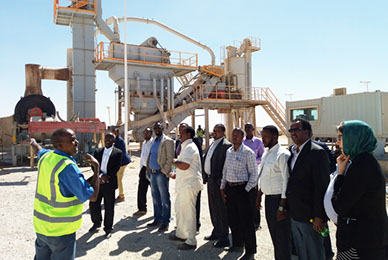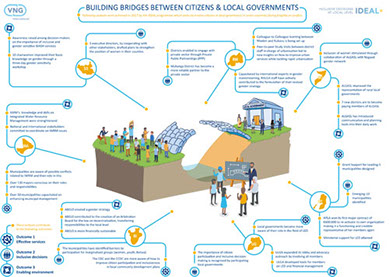Annual Update 2018 VNG International


Infograph Burundi
Infograph Mali
Infograph Palestine
Infograph Rwanda
Infograph Somalia
Infograph Uganda
Infograph South Sudan
‘The APLA reactivation plan developed with VNG International along with our Bylaws of 2018 are always in my bag. I must have read like a 100 times. It really helped in finding the right way.’
Abdallah Anati
Executive Director of the Association of Palestinian Local Authorities
‘This is the first time I have been able to openly discuss gender issues with so many decision-makers from Somaliland’s local governments around the table.’
Ms Nafisa Yusuf Mohamed
Director of Nagaad Network
‘The way LED is looked at under IDEAL, by focusing on the territorial approach towards LED implementation is the best possible way- no other similar initiatives exist and as such it is an unique programme.’
Ms. Assumpta Ikiriza Timbamweda project coordinator for Local Economic Development at the Ministry of Local Government and Lead trainer for LED within IDEAL
Involving Citizens in Decision Making by strengthening local government
Featured Project
Inclusive Decisions
at Local Level
(IDEAL)
> The IDEAL programme covers seven countries facing fragility or conflict: Burundi, Mali, Palestinian Territories, Rwanda, Somaliland, South Sudan, and Uganda. In each of these countries the programme focuses on a topic affecting local stability and in which citizens’ voices are not yet sufficiently heard. Despite the diverging contexts and topics in the programme, we still pursue one common objective: involving citizens in local governance and strengthening local authorities to deal with fragility risks. Each of the seven individual country programmes is centred around the same three outcomes: 1. Effective services; 2. Inclusive decisions; and 3. Enabling environment.
Results include:
- IDEAL Gender Sensitivity Guidelines and Conflict Sensitivity Guidelines have been developed as one of the steps to ensure that project implementation is conflict & gender sensitive.
- Concerning effective services:
- The CDC and the CCDC in the participating Burundian municipalities are more aware of how to improve citizen participation and inclusiveness in local community development plans;
- Participating municipalities in Mali are aware of possible conflicts related to Integrated Water Resources Management (IWRM) and their role in this; Over 130 mayors are now conscious of their roles and responsibilities; Over 50 municipalities have been capacitated on enhancing municipal management;
- District staff in charge of urbanisation in Rwandan secondary cities have gained new insights on how to improve urban services while tackling rapid urbanisation;
- The participating Ugandan local governments became more aware of their role in the field of Local Economic Development.
- Concerning inclusive decisions:
- The municipalities in Burundi have identified barriers to participation for marginalised groups (women, youth, Batwa);
- Rwandan districts have been enabled to engage with the private sector through Public Private Partnerships (PPP); Muhanga District has become a more reliable partner to the private sector;
- The inclusion of women has been stimulated through collaboration of the Association of Local Government Authorities of Somaliland (ALGASL) with Nagaad gender network;
- Three local government executive directors in South Sudan, by cooperating with other stakeholders, drafted plans to strengthen the position of women in their counties.
- Concerning enabling environment:
- The Association of Burundi Municipalities (ABELO) created a gender strategy; ABELO also contributed to the creation of an Arbitration Board for the law on decentralisation, transferring responsibilities to the local level; ABELO is more financially sustainable;
- The Association of Mali Municipalities (AMM)’s knowledge and skills on IWRM were strengthened; National and international stakeholders committed to coordinate on IWRM issues;
- The Association of Palestinian Local Authorities (APLA) won its first major contract of €600,000 to re-activate its own organization making it a functioning and credible representative of her members again; Ministerial support for LED has been obtained;
- Capacitated by international experts in gender mainstreaming, Rwanda Association of Local Government Authorities (RALGA) staff have actively contributed to the formulation of their revised gender strategy;
- LGASL improved the representation of rural local governments; 7 new districts are to become paying members of ALGASL; ALGASL has introduced communication and planning tools into their daily work;
- There is raised awareness among local decision-makers in South Sudan on the importance of inclusive and gender sensitive WASH services; 10 chairwomen improved their basic knowledge on gender through a three-day gender sensitivity workshop;
- The Uganda Local Government Association (ULGA) expanded its lobby and advocacy outreach by involving all members ULGA developed tools for members on LED and financial management.